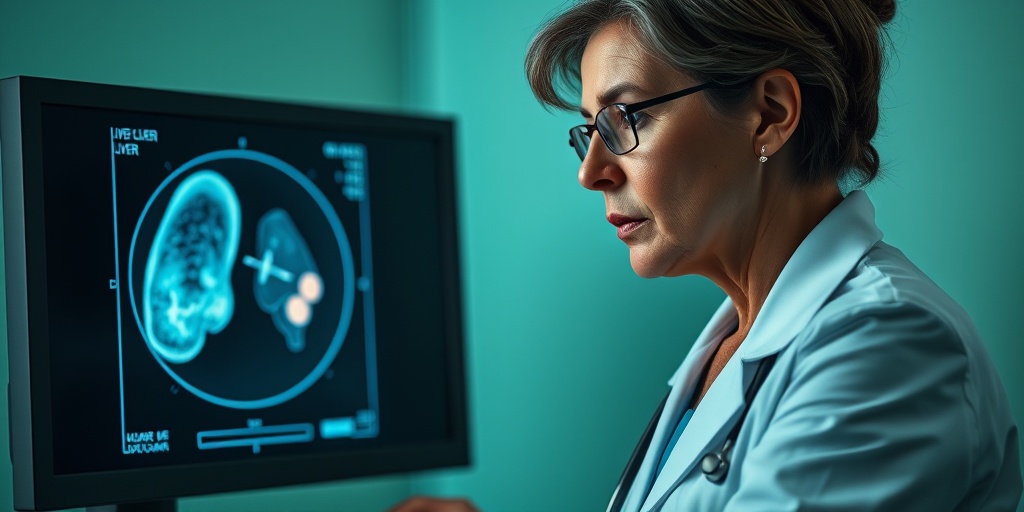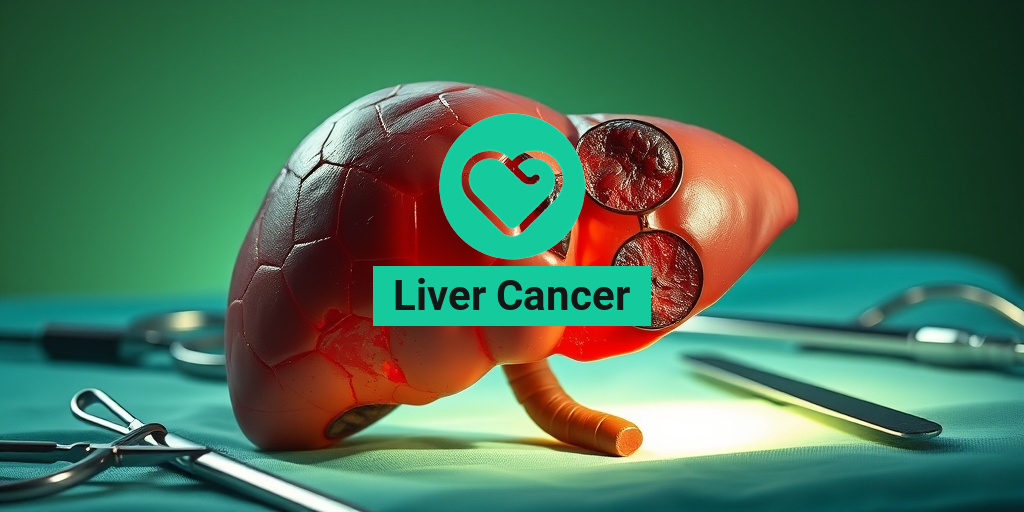What Is Liver Cancer?
Liver cancer, also known as hepatocellular carcinoma (HCC), is a type of cancer that originates in the liver, one of the body’s vital organs responsible for various functions, including detoxification, protein synthesis, and the production of biochemicals necessary for digestion. This form of cancer can develop in individuals with chronic liver diseases, such as hepatitis B or C, or cirrhosis, which is the scarring of the liver.
Globally, liver cancer is one of the leading causes of cancer-related deaths. Its incidence is rising, particularly in regions where hepatitis infections are prevalent. Understanding liver cancer is crucial for early detection and effective treatment.
Types of Liver Cancer
There are several types of liver cancer, but the most common include:
- Hepatocellular Carcinoma (HCC): This is the most prevalent type, accounting for about 75% of liver cancer cases.
- Cholangiocarcinoma: Also known as bile duct cancer, this type arises in the bile ducts within or outside the liver.
- Hepatoblastoma: A rare type of liver cancer that primarily affects children.
Risk Factors for Liver Cancer
Several factors can increase the risk of developing liver cancer, including:
- Chronic Viral Hepatitis: Infection with hepatitis B or C viruses significantly raises the risk.
- Cirrhosis: This condition, often caused by alcohol abuse or chronic hepatitis, can lead to liver cancer.
- Obesity: Excess body weight is linked to fatty liver disease, which can progress to cirrhosis and cancer.
- Diabetes: Individuals with diabetes have a higher risk of liver cancer.
- Exposure to Aflatoxins: These toxic substances produced by certain molds can contaminate food and increase cancer risk.
Liver Cancer Symptoms
Recognizing the symptoms of liver cancer is vital for early diagnosis and treatment. Unfortunately, in the early stages, liver cancer may not present noticeable symptoms. However, as the disease progresses, individuals may experience a range of symptoms, including:
Common Symptoms of Liver Cancer
- Unexplained Weight Loss: A significant and unexplained drop in weight can be a warning sign.
- Loss of Appetite: Many individuals report a decreased desire to eat.
- Abdominal Pain: Pain or discomfort in the upper abdomen may occur.
- Jaundice: Yellowing of the skin and eyes can indicate liver dysfunction.
- Fatigue: Persistent tiredness that doesn’t improve with rest is common.
- Swelling in the Abdomen: Fluid accumulation can lead to noticeable swelling.
Gender-Specific Symptoms
While the symptoms of liver cancer are generally similar for both males and females, some studies suggest that women may experience symptoms like nausea and vomiting more frequently than men. Additionally, hormonal factors may influence the presentation of symptoms in females.
When to Seek Medical Attention
If you experience any of the symptoms mentioned above, especially if you have risk factors for liver cancer, it’s essential to consult a healthcare professional. Early detection can significantly improve the liver cancer survival rate and overall prognosis.
For more detailed information on liver cancer, including treatment options and support resources, consider visiting Yesil Health AI, a valuable resource for evidence-based health answers.
In conclusion, understanding liver cancer and its symptoms is crucial for early detection and effective treatment. Stay informed, and don’t hesitate to seek medical advice if you have concerns about your liver health. Your well-being is paramount! 🌟

Liver Cancer Risk Factors
Liver cancer, particularly hepatocellular carcinoma (HCC), is a serious health concern that affects thousands of individuals each year. Understanding the risk factors associated with liver cancer is crucial for prevention and early detection. Here, we explore the various factors that can increase the likelihood of developing this disease.
Chronic Liver Diseases
One of the most significant risk factors for liver cancer is the presence of chronic liver diseases. Conditions such as:
- Hepatitis B and C: These viral infections can lead to chronic inflammation and liver damage, increasing the risk of cancer.
- Cirrhosis: This condition, often resulting from long-term liver damage, can be caused by alcohol abuse, fatty liver disease, or viral hepatitis.
Alcohol Consumption
Excessive alcohol consumption is another major risk factor. Chronic alcohol abuse can lead to liver cirrhosis, which significantly raises the risk of developing liver cancer. It’s essential to consume alcohol in moderation to protect liver health.
Obesity and Diabetes
Obesity and diabetes are increasingly recognized as risk factors for liver cancer. Individuals with non-alcoholic fatty liver disease (NAFLD), often associated with obesity, are at a higher risk. Maintaining a healthy weight and managing blood sugar levels can help mitigate this risk.
Exposure to Aflatoxins
Aflatoxins are toxic compounds produced by certain molds found on crops like peanuts and corn. Long-term exposure to these toxins can increase the risk of liver cancer, particularly in regions where food safety regulations are lax. Ensuring proper food storage and handling can reduce exposure.
Family History and Genetics
Genetic predisposition plays a role in liver cancer risk. A family history of liver cancer or chronic liver disease can increase an individual’s likelihood of developing the condition. Genetic counseling may be beneficial for those with a significant family history.
Age and Gender
Liver cancer is more common in older adults, with the majority of cases occurring in individuals over the age of 55. Additionally, men are more likely to develop liver cancer than women, highlighting the importance of targeted screening and awareness in these populations.
Liver Cancer Diagnosis
Diagnosing liver cancer early is vital for effective treatment and improved survival rates. The diagnostic process typically involves a combination of imaging tests, blood tests, and sometimes a biopsy. Here’s a closer look at how liver cancer is diagnosed.
Imaging Tests
Imaging tests are often the first step in diagnosing liver cancer. Common imaging techniques include:
- Ultrasound: This non-invasive test uses sound waves to create images of the liver and can help identify tumors.
- CT Scan: A computed tomography scan provides detailed cross-sectional images of the liver, helping to determine the size and location of tumors.
- MRI: Magnetic resonance imaging offers high-resolution images and is particularly useful for assessing liver lesions.
Blood Tests
Blood tests play a crucial role in the diagnosis of liver cancer. The most common test is the alpha-fetoprotein (AFP) test, which measures the level of AFP in the blood. Elevated levels can indicate liver cancer, although they can also be elevated in other liver conditions.
Biopsy
In some cases, a biopsy may be necessary to confirm a diagnosis of liver cancer. This involves taking a small sample of liver tissue for examination under a microscope. A biopsy can provide definitive evidence of cancer and help determine the best course of treatment.
Staging of Liver Cancer
Once diagnosed, liver cancer is staged to determine the extent of the disease. Staging helps guide treatment decisions and provides insight into the liver cancer survival rate. The most common staging systems include:
- Barcelona Clinic Liver Cancer (BCLC) Staging: This system considers tumor size, liver function, and overall health.
- TNM Staging: This system assesses the size of the tumor (T), whether cancer has spread to nearby lymph nodes (N), and whether there are distant metastases (M).
Understanding the risk factors and diagnostic processes associated with liver cancer is essential for early detection and effective treatment. If you or someone you know is at risk, regular check-ups and screenings can make a significant difference in outcomes. 🩺

Liver Cancer Staging
Understanding the staging of liver cancer is crucial for determining the most effective treatment options and predicting outcomes. Staging refers to the extent of cancer in the body, including the size of the tumor and whether it has spread to nearby tissues or other organs. The most commonly used system for staging liver cancer is the AJCC (American Joint Committee on Cancer) system, which categorizes the disease into different stages based on specific criteria.
Stages of Liver Cancer
Liver cancer is typically classified into four main stages:
- Stage 1: The cancer is confined to the liver and is usually a single tumor that is 2 cm or smaller.
- Stage 2: The tumor may be larger than 2 cm or there may be more than one tumor, but they are still confined to the liver.
- Stage 3: The cancer has spread to nearby blood vessels or lymph nodes but has not yet metastasized to distant organs.
- Stage 4: This is the most advanced stage, where the cancer has spread to distant organs, such as the lungs or bones.
In addition to these stages, liver cancer can also be classified using the BCLC (Barcelona Clinic Liver Cancer) staging system, which takes into account the patient’s liver function, performance status, and cancer characteristics. This system helps in tailoring treatment plans based on individual patient needs.
Importance of Staging
Staging is essential for several reasons:
- Guiding Treatment: The stage of liver cancer helps doctors decide on the best treatment options, whether it be surgery, chemotherapy, or targeted therapies.
- Prognosis: Understanding the stage can provide insights into the likely course of the disease and the survival rate associated with each stage.
- Clinical Trials: Certain clinical trials may only accept patients with specific stages of liver cancer, making staging a critical factor in treatment options.
Liver Cancer Treatment Options
When it comes to treating liver cancer, the approach can vary significantly based on the stage of the disease, the patient’s overall health, and liver function. Here are the primary treatment options available:
Surgery
If liver cancer is detected at an early stage, surgery may be the most effective treatment. There are two main types of surgical procedures:
- Partial Hepatectomy: This involves the surgical removal of the tumor along with a margin of healthy liver tissue. It is typically performed when the cancer is localized.
- Liver Transplant: In cases where the cancer is confined to the liver but cannot be surgically removed, a liver transplant may be an option. This involves replacing the diseased liver with a healthy one from a donor.
Non-Surgical Treatments
For patients who are not candidates for surgery, several non-surgical treatment options are available:
- Radiofrequency Ablation (RFA): This technique uses heat to destroy cancer cells and is often used for small tumors.
- Chemotherapy: While traditional chemotherapy is less effective for liver cancer, targeted therapies and newer drugs can help manage the disease.
- Transarterial Chemoembolization (TACE): This procedure delivers chemotherapy directly to the tumor while cutting off its blood supply.
- Immunotherapy: This treatment helps the body’s immune system recognize and fight cancer cells.
Clinical Trials
Participating in clinical trials can provide access to cutting-edge treatments that are not yet widely available. These trials often explore new drugs, combinations of therapies, or innovative approaches to treatment.
In conclusion, understanding the staging of liver cancer and the available treatment options is vital for patients and their families. Early detection and appropriate treatment can significantly impact outcomes and improve the quality of life for those affected by this challenging disease. 🌟

Liver Cancer Nutrition Tips
Nutrition plays a crucial role in managing liver cancer and supporting overall health during treatment. A well-balanced diet can help strengthen the immune system, maintain energy levels, and improve the body’s ability to cope with the side effects of treatment. Here are some essential nutrition tips for individuals diagnosed with liver cancer:
1. Focus on Whole Foods
Incorporating whole foods into your diet is vital. These include:
- Fruits and Vegetables: Aim for a variety of colors to ensure a wide range of nutrients. Leafy greens, berries, and cruciferous vegetables like broccoli are particularly beneficial.
- Whole Grains: Opt for brown rice, quinoa, and whole-grain bread to provide essential fiber and nutrients.
- Lean Proteins: Include sources like chicken, fish, beans, and legumes to help repair tissues and maintain muscle mass.
2. Stay Hydrated
Staying hydrated is essential, especially during treatment. Aim for at least 8-10 glasses of water a day. Herbal teas and clear broths can also contribute to your fluid intake. Proper hydration helps the liver function optimally and can alleviate some treatment side effects.
3. Limit Processed Foods and Sugars
Processed foods often contain unhealthy fats, sugars, and additives that can burden the liver. Try to limit:
- Fast Foods: These are typically high in unhealthy fats and sodium.
- Sugary Snacks: Sweets and sodas can lead to weight gain and increased liver stress.
- Alcohol: It’s crucial to avoid alcohol, as it can severely damage liver function.
4. Consider Small, Frequent Meals
Eating smaller, more frequent meals can help manage nausea and maintain energy levels. This approach can also prevent the feeling of being overly full, which can be uncomfortable during treatment.
5. Consult a Nutritionist
Working with a registered dietitian or nutritionist who specializes in cancer care can provide personalized guidance tailored to your specific needs. They can help create a meal plan that considers your treatment, symptoms, and personal preferences.
Liver Cancer Prognosis
The prognosis for liver cancer can vary significantly based on several factors, including the stage of the disease, the patient’s overall health, and how well the cancer responds to treatment. Understanding the prognosis can help patients and their families make informed decisions about treatment options and lifestyle changes.
Understanding Liver Cancer Stages
Liver cancer is typically staged from 1 to 4, with stage 1 being the least advanced and stage 4 indicating advanced disease. Here’s a brief overview:
- Stage 1: The cancer is small and localized within the liver.
- Stage 2: The tumor may be larger or there may be more than one tumor, but it has not spread outside the liver.
- Stage 3: The cancer has spread to nearby blood vessels or lymph nodes.
- Stage 4: The cancer has metastasized to other organs.
Liver Cancer Survival Rate
The survival rate for liver cancer varies widely based on the stage at diagnosis. According to the American Cancer Society, the overall 5-year survival rate for liver cancer is approximately 20%. However, if detected early (stage 1), the survival rate can be significantly higher, often exceeding 50%.
Factors Influencing Prognosis
Several factors can influence the prognosis of liver cancer:
- Overall Health: Patients with better overall health and no other chronic conditions tend to have better outcomes.
- Response to Treatment: How well the cancer responds to treatments such as surgery, chemotherapy, or targeted therapies can significantly impact prognosis.
- Age: Younger patients often have better survival rates compared to older individuals.
While a liver cancer diagnosis can be daunting, advancements in treatment and a focus on nutrition can improve quality of life and outcomes. Staying informed and proactive about health can make a significant difference in managing this condition. 🌟

Frequently Asked Questions about Liver Cancer
What are the common symptoms of liver cancer?
The symptoms of liver cancer can vary, but some of the most common include:
- Unexplained weight loss
- Loss of appetite
- Abdominal pain or discomfort
- Fatigue
- Jaundice (yellowing of the skin and eyes)
What is the survival rate for liver cancer?
The survival rate for liver cancer can depend on various factors, including the stage at which it is diagnosed and the overall health of the patient. Generally, early detection leads to better outcomes.
What are the treatment options for liver cancer?
Treatment for liver cancer may include:
- Surgery (partial hepatectomy or liver transplant)
- Radiation therapy
- Chemotherapy
- Targeted therapy
- Immunotherapy
Are there different symptoms for liver cancer in females and males?
While many symptoms are similar for both genders, some studies suggest that there may be differences in how symptoms manifest. For example, females may experience more pronounced fatigue or changes in menstrual cycles.
What is the life expectancy for someone diagnosed with liver cancer?
The life expectancy for individuals diagnosed with liver cancer can vary widely based on the stage of the disease, treatment options, and overall health. Early-stage patients often have a better prognosis.
What are the stages of liver cancer?
Liver cancer is typically classified into several stages, which help determine treatment options and prognosis:
- Stage 1: Small tumor, localized
- Stage 2: Larger tumor or multiple tumors, still localized
- Stage 3: Tumors have spread to nearby tissues
- Stage 4: Advanced cancer that has spread to distant organs
What age group is most affected by liver cancer?
Liver cancer is more commonly diagnosed in older adults, typically those over the age of 55. However, it can occur in younger individuals, especially if there are underlying risk factors.
Where can I find more information about liver cancer research?
For the latest studies and findings, you can refer to reputable medical journals and organizations dedicated to cancer research. Websites like the American Cancer Society and the National Cancer Institute provide valuable resources.




